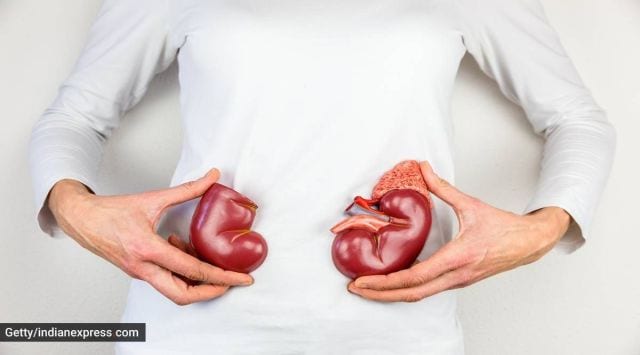World Kidney Cancer Day: How is hypertension linked to the disease?
The kidneys play a vital role in maintaining blood pressure stability. Disruption of this system due to kidney cancer can lead to elevated blood pressure levels. Prolonged high blood pressure in turn can damage blood vessels and impair kidney function, says Dr Himesh Gandhi, Uro-Oncologist and Robotic, Laparoscopic Uro-Surgeon, Ruby Hall Clinic, Pune
 Lifestyle modifications, such as maintaining a healthy weight, adopting a balanced diet, engaging in regular physical activity, quitting smoking, and managing diabetes effectively are essential in managing hypertension and reducing the risk of kidney cancer. (Image Source: Getty Images)
Lifestyle modifications, such as maintaining a healthy weight, adopting a balanced diet, engaging in regular physical activity, quitting smoking, and managing diabetes effectively are essential in managing hypertension and reducing the risk of kidney cancer. (Image Source: Getty Images) Hypertension, commonly known as high blood pressure, is a prevalent medical condition affecting millions of individuals worldwide. While it is typically associated with lifestyle factors such as poor diet and lack of exercise, there are certain health conditions, including kidney cancer, that can be influenced by or contribute to hypertension.
Kidney cancer, also referred to as renal cell carcinoma, is a malignant disease characterised by the uncontrolled growth of abnormal cells within the kidneys. Hypertension has been identified as both a risk factor for kidney cancer development and a consequence of the disease itself.
One possible explanation for the link between hypertension and kidney cancer lies in the intricate relationship between the kidney and blood pressure regulation.
HOW DO KIDNEYS INFLUENCE HYPERTENSION?
The kidneys play a vital role in maintaining blood pressure stability through the renin-angiotensin-aldosterone (RAS) system. This complex mechanism involves the release of hormones that control blood vessel constriction, fluid balance and sodium reabsorption. Disruption of this system due to kidney cancer can lead to elevated blood pressure levels.
Furthermore, the tumour itself can directly contribute to hypertension. Certain kidney cancers can produce substances known as renin-like proteins or erythropoietin, which can influence blood pressure. Renin-like proteins mimic the actions of renin, an enzyme involved in regulating blood pressure. Erythropoietin is a hormone responsible for stimulating red blood cell production, and excessive production of this hormone because of kidney cancer can lead to hypertension.
In addition to these direct mechanisms, kidney cancer can indirectly impact blood pressure through compression of blood vessels. As the tumour grows, it may exert pressure on nearby blood vessels, obstructing blood flow and causing an increase in blood pressure. This compression effect can disrupt the normal circulation of blood, leading to hypertension as a consequence of reduced blood flow to organs.
HOW DOES HYPERTENSION IMPACT KIDNEYS?
On the other hand, hypertension can also contribute to the development of kidney cancer. Prolonged high blood pressure can damage blood vessels and impair kidney function. The kidneys’ role in filtering waste products and maintaining fluid and electrolyte balance makes them susceptible to damage caused by uncontrolled hypertension. Over time, this damage can lead to the development of kidney cancer.
Given the bidirectional relationship between hypertension and kidney cancer, individuals diagnosed with one condition should be monitored for the other. Healthcare professionals play a crucial role in assessing the risk factors and managing these interconnected conditions effectively. Regular blood pressure screenings and kidney function tests are essential for early detection and intervention.
TREATMENT OF KIDNEY CANCER
The management of hypertension in kidney cancer patients often involves a multidisciplinary approach. Treatment options may include lifestyle modifications, such as adopting a healthy diet, engaging in regular exercise and reducing stress. Additionally, medication to control blood pressure, such as angiotensin-converting enzyme inhibitors or angiotensin receptor blockers, may be prescribed. In cases where the hypertension is caused by the tumour itself, addressing the underlying cancer through surgical intervention, radiation therapy, or targetted drug treatments is necessary.
RISK ASSESSMENT
Common risk factors that often coexist with hypertension include obesity, diabetes and smoking. These factors not only increase the risk of developing hypertension but also compound the risk of kidney cancer. Let’s explore each of these risk factors and their relationship with hypertension and kidney cancer.
1. Obesity: Obesity is a significant risk factor for both hypertension and kidney cancer. Excess weight puts strain on the cardiovascular system, leading to increased blood pressure. Adipose tissue, or body fat, also produces hormones and inflammatory substances that can disrupt normal blood pressure regulation. Moreover, obesity is associated with insulin resistance and metabolic abnormalities, which further contribute to hypertension. In the case of kidney cancer, obesity is believed to promote the development of renal cell carcinoma through various mechanisms, including hormonal imbalances, chronic inflammation and altered immune function.
2. Diabetes: Diabetes and hypertension often coexist and the two conditions can exacerbate each other. Diabetes is characterised by high blood sugar levels, and over time, it can damage blood vessels and impair the kidneys’ filtering ability, leading to hypertension. Diabetic nephropathy, a kidney disease caused by diabetes, is a significant risk factor for kidney cancer. The exact mechanisms linking diabetes to kidney cancer are not fully understood, but it is believed that chronic kidney inflammation and the presence of high levels of insulin and insulin-like growth factors may play a role.
3. Smoking: Smoking is a well-established risk factor for hypertension and kidney cancer. The chemicals in tobacco smoke can damage blood vessels, increase heart rate and elevate blood pressure. Smoking also affects the kidneys directly by reducing blood flow to these organs. In the context of kidney cancer, smoking is a known carcinogen and has been associated with an increased risk of renal cell carcinoma. The harmful substances in tobacco smoke can accumulate in the kidneys and cause DNA damage, leading to the development of cancerous cells.
When these risk factors coexist with hypertension, they create a perfect storm, significantly compounding the risk of kidney cancer.
The interplay between hypertension, obesity, diabetes and smoking creates a hostile environment that promotes the growth of cancerous cells in the kidneys. Chronic inflammation, oxidative stress, hormonal imbalances and compromised immune function associated with these risk factors contribute to the initiation and progression of kidney cancer.
Addressing these risk factors is crucial in reducing the risk of both hypertension and kidney cancer. Lifestyle modifications, such as maintaining a healthy weight, adopting a balanced diet, engaging in regular physical activity, quitting smoking, and managing diabetes effectively are essential in managing hypertension and reducing the risk of kidney cancer. Regular screenings, early detection and appropriate medical interventions can help mitigate the risks associated with these interconnected conditions and improve overall health outcomes.



































